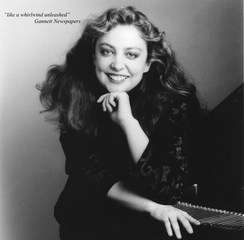|
Back
Beauties and the Beast New York
Weill Recital Hall, Carnegie Hall
09/19/2017 -
Wolfgang Amadeus Mozart: Sonata in C Major, K. 330
Ludwig van Beethoven: Sonata in F Minor (“Appassionata”), Opus 57
Arvo Pärt: Für Alina
Anatole Liadov: Prelude, Opus 11, No. 1
Alexander Scriabin: Etude in B Major, Opus 8, No. 4
Alexander Glazunov: Etude in E Major (“La Nuit”)
Nikolai Kapustin: Etude (“Rêverie”), Opus 40, No. 2
Sergei Rachmaninoff: Etude-Tableau in E-flat Major, Opus 33, No. 7
Pyotr Ilych Tchaikovsky: Scherzo from Sixth Symphony (“Pathétique”), Opus 74 (Arranged for piano by Samuel Feinberg)
Rorianne Schrade (Pianist) 
Rorianne Schrade (© Christian Steiner)
“Oh! You are late and must get home! You run, but keep thinking of going back to that house. Which way should you go? A lot should be explored, but you feel like you are being chased! Run–faster!!”
Rorianne Schrade: Description of Allegro non troppo for children, from Beethoven Appasionata.
Minutes before Rorianne Schrade’s opening, I knew that even if she had been ham-handed and unmusical, I would love this concert. While many an esteemed composer writes music for children, Ms. Schrade had the joyful chutzpah to write about music for children, to give descriptions of Beethoven and Mozart and Tchaikovsky and even that menacing Alexander Scriabin.
Did the images work? The effort was possibly greater than the effect. An eight-year-old kid in my row fidgeted throughout the recital, another fell asleep. And while I relished the concept, perhaps the images of bells, angels, fairies and stories, might be tiresome any 2017 kid over the age of four.
But that hardly detracted from Ms. Schrade’s musicality, her technique, and her easy, comfortable rapport with an audience of admirers, strangers and friends.
My first (and only) contact with the Schrade family–the late Robert Schrade and his talented wife and daughters–was many years ago in their 250-year-old house sited in the charming village of South Worthington Massachusetts during their Sevenars Festival (named after the R-named seven daughters).

Robelyn Schrade (© Coco A. Dog)
Other artists were performing that Sunday, but when Robelyn Schrade pleaded in the intermission for the audience to look for a missing Labrador, my heart took a leap. (That dog was found, my own dog in gratitude took the picture above.)
Rorianne Schrade has that same warmth, that same geniality in her comments–and her music–which I found several summers ago. And, aside from one monstrous selection, this was a most genial recital.
The first half was familiar enough, and if it zoomed to an end too quickly, this was because the pianist eschewed playing most of the repeats. The sin of omission was rectified by a technique, color and zest in both works that reached out to the packed Weill Recital Hall audience. In fact, to enchant any audience, to bring them to one’s side, the Mozart K.330 Sonata is heaven-sent. The work is not “cute” or “heavy” Mozart. It is an enchantment in all three movements, and Ms. Schrade played it as such.
Her touch was not light or elfin, it was suitably heavy to make the themes ring out, the Andante cantabile yes, did sing, and the dancing finale gave out all the surprises which an obviously delighted Mozart wanted to give. Nothing idiosyncratic, simple lovely vocalizations.
The Appasionata probably wouldn’t have pleased more venerated older artists. Beethoven’s work is tragic from beginning to end, and pianists have always searched for that internal “passionate” desolation. Ms. Schrade perhaps felt that such a friendly audience, in a world filled with earthquakes, Trumps and hurricanes, didn’t deserve to suffer more.
Thus she played the work with a radiant delight. That is hardly easy, but the pianist has such an felicitous piano engagement that one never regretted a less weighty performance. The first movement was, as ever under Ms. Schrade’s fingers, lyrical, youthful, the stentorian notes merely fanfares. That so tragic short Andante became a berceuse, not an omen. And in the last movement, one had the chance to marvel at the artist’s well-trained fingers than her meaning.
Still, when she played the Presto coda, one hardly regretted the vivacious emotion. This was more than fine playing, it reached out to an audience longing for...well, for entertainment. (That might be a questionable word, more apropos to Kelly and Astaire than Beethoven, but I stand by the concept.)
The second half switched to purely Russian–except for Estonian Arvo Pärt’s gorgeous campanella, Für Alina. Liadov, Scriabin, Kapustin and Glazunov each contributed an elegant etude, and if they were mere salon pieces, Ms. Schrade played them with dedication. That changed to a marvelous martial Rachmaninoff Etude-Tableau where the artist was at her finest. Its familiarity never detracted from its splendid colors, nuance, rhythms and persuasiveness.
Unfortunately Ms. Schrade ended this Arden Forest of delights with a Caliban-style monster. Specifically Russian composer-pianist Samuel Feinstein’s arrangement of the Tchaikovsky Sixth Symphony Scherzo.
The orchestral original is barbaric, huge, a behemoth of scurrying strings, trumpet flourishes, orchestral climaxes. Obviously, except for pedagogical purposes, that should never be transcribed. Mr. Feinberg did, though. And any professional psycho-musicologist (if such a profession exists) might deem it pathological hysteria.
I suppose that Ms. Schrade deserves credit for playing with nary a mistake (though she did get confused in the mesh of a few measures), but after a minute, it became a blur, a series of smudges interrupted by a few familiar entr’actes.
Ms. Schrade’s formidable technique was changed to “extreme sports” here, though that soon wore off for this listener. Not for others in the audience who, at the end, immediately leaped to their feet and applauded as if she had finished the Hammerklavier.
As the only person not applauding, I was the curmudgeon, but it was nothing personal. I loved the concert, admired her well-rounded, personal camaraderie and impeccably singular musical taste.
Harry Rolnick
|